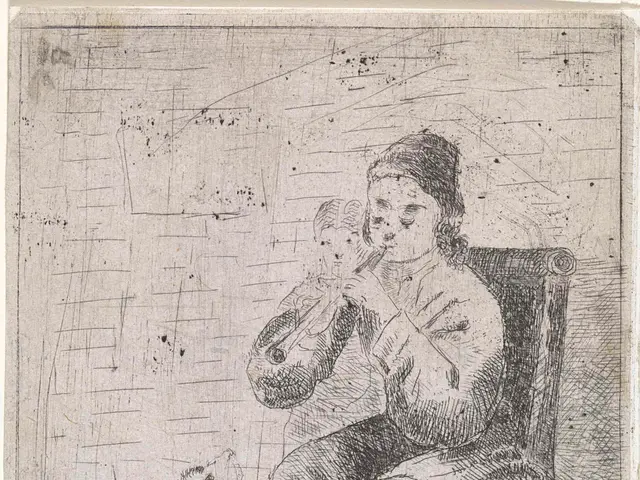Two Modern Moms Grapple with Emotional Tensions
Booming Through the Decades: Pedro Almodóvar's Journey as a Provocative Storyteller
Legendary writer-director Pedro Almodóvar has spent five decades creating movies, continually pushing boundaries while staying true to his playfully provocative roots. His latest offering, Parallel Mothers, originally conceived over 20 years ago, delves into Spanish identity and the historical origins of his artistic passions.
Parallel Mothers sees Penélope Cruz in a captivating role as Janis, a photographer vested in uncovering familial truths, all while preparing to embrace motherhood. Tangled with Janis is Ana, played by Milena Smit, whose appearances at the maternity ward set off a psychologically intense bond between the two. In an atypical twist for Almodóvar, the entwined lives of Janis and Ana serve as a platform to explore the roots of his artistic compulsions and the nation's historical traumas that defined him.
Back in the early days, Almodóvar penned the embryonic idea for Parallel Mothers while promoting All About My Mother. Almost two decades later, he completed the first draft in 2009. In the beginning, Pain and Glory, Women on the Verge of a Nervous Breakdown, and The Flower of My Secret were the only films he managed to write in just a few months. As for the rest, they took a substantial amount of time and, surprisingly, he found this prolonged process to be his preferred approach.
The screenplay for Parallel Mothers was completed during the pandemic lockdown, with Almodóvar explaining, "I simply needed an all-consuming activity. Writing was one of the things that helped me kill time." He opportunities to refine some of the script's nuances that weren't fully realized during the first draft.
Parallel Mothers introduces us to two main characters, Janis and Ana, who coincide in a hospital room for childbirth. Janis, a middle-aged woman, is excited about her decision, while Ana, a young teenager, is fearful, regretful, and traumatized. Their few conversations create an unbreakable bond, which develops and complicates their lives in unexpected ways.
Raised among women, including his own mother and neighborhood acquaintances, Almodóvar has admired female strength throughout his life, emerging from their resilience and perseverance in the face of adversity. Yet, Parallel Mothers introduces contemporary mothers who juggle their roles as caretakers and breadwinners under different circumstances.
Playing the part of Janis required a great deal of effort from Penélope Cruz. The complexity of the character's divided intent and guilt demanded a nuanced performance, especially since Ana perfectly fits into the role of a doting mother. Almodóvar expressed his trust in Cruz's ability: "I believe that she will deliver everything I need to fully inhabit the character."
The bond between the two women reflects their mutual desire to build families, as they both find themselves orphans in their own ways. Almodóvar's fascination with this desire to form a family extended to questions about family history, as well as the role of young generations like Ana in understanding and dealing with the past. He sums up these aspirations: "I wanted to illuminate the struggles and pain faced by relatives searching for their loved ones, while urging young generations to appreciate history and overcome the mistakes of the past."
As Cruz towers as Janis, her character treads a narrow line of self-doubt and determination. At times, the character appears independent of the author, taking on a life of her own. Almodóvar describes this part of the writing process as a mysterious, almost supernatural phenomenon. For the first time, he notes that he has placed a character as challenging as Janis in Cruz's capable hands, having faith that she would bring the character to life.
Watch on SHOWMAX
Both cinematographer José Luis Alcaine and composer Alberto Iglesias are integral parts of Almodóvar's creative process, each elevating the film's visuals and musical components. Alcaine's luminous photography for Parallel Mothers emphasizes the story's inherent tension, while Iglesias' score subtly accompanies the characters' emotions and actions.
Share this:
Related:
- Understanding Pedro Almodóvar: A Deep Dive into the Artistic Obsessions Shaping His Cinematic Universe
- Framing Conflict and Unraveling Identity: The Historical Legacy of Spain's Civil War in Almodóvar's Cinematic Universe
- Examining the Dramatic Influences: How Almodóvar's Work is Shaped by Literature and Theater
- Navigating the Labyrinth of Gender in Almodóvar's Cinematic Universe
During the writing process of "Parallel Mothers," Almodóvar found solace in crafting the script during the pandemic lockdown, using it as an opportunity to refine some nuances that weren't fully realized during the first draft. This captivating film, set in the world of entertainment and movies-and-tv, delves into the writing process of one of cinema's most provocative storytellers, Pedro Almodóvar.








